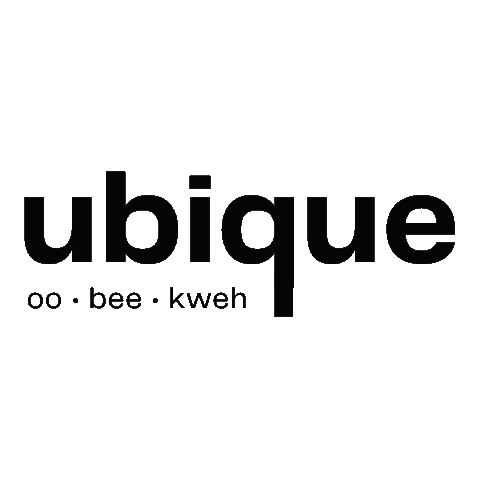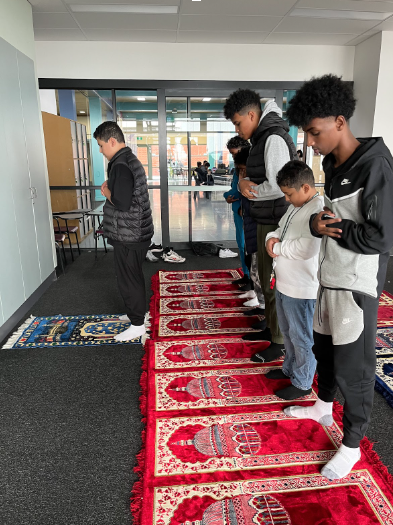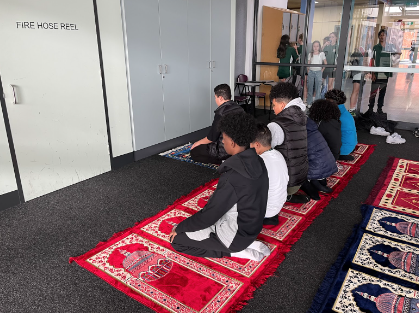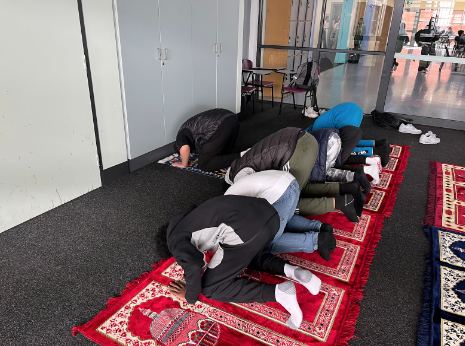Religious Holidays Explained: Ramadan & Eid
By Riyaq Abdi & Ghada Aldosry
What does Ramadan mean to us?
For us Muslims, Ramadan is a time of giving, self-reflection, togetherness and the expression of gratitude for the blessings in one’s life. It means shifting your focus on renewing our spiritual commitment, self discipline, and practice. It means cutting off something we live off everyday to empathise with the less fortunate and show generosity towards them. It means sacrificing our time to practise gratitude and show worship to our one and only God.
Ramadan gives us the opportunity to reflect on ourselves as people and what we can do to better ourselves spiritually, mentally and physically. Consciously engaging in more prayer and recitation of the Quran (the holy book for Muslims) allows us to truly pause from the stress and worries of this world and instead focus on the words of Allah (God). This helps us remove negative thoughts and actions, allowing for both spiritual and mental healing.
How long does Ramadan go for and what happens after?
The month of Ramadan usually goes from 28-30 days but changes every year. The month is declared by the sighting of the moon and once spotted, all Muslims can finally fast. After the holy month, Muslims celebrate Eid al-Fitr. Eid is usually celebrated by the coming together of a wider community with family and friends, marked by a morning prayer, delicious food and beautiful cultural clothing.
What do the drawings on your hands represent?
A student’s henna tattoo.
At the end of Ramadan, at the sighting of the new crescent moon, Muslims return to the joys of physical life: food, drink, and sexuality, appreciating the gifts of life more for the month's privation. Henna is a symbol of, and part of, the earthly delight in being alive. This is the way some females celebrate, and though each family has its own set of traditions, getting Eid henna done is a particularly popular part of the celebrations for Muslims across the globe.
Why do Muslims fast?
There are many reasons why Muslims fast. That includes:
Fulfilling one of the five pillars of Islam: fasting during Ramadan is considered one of the five pillars of Islam, which are the basic acts of worship that are mandatory for Muslims. By fulfilling this pillar, Muslims demonstrate their commitment to the faith.
Purifying the Body and Mind: fasting is believed to have a purifying effect on the body and mind, allowing Muslims to have their spiritual growth and development.
Increasing empathy for those who are less fortunate: by experiencing hunger and thirst, Muslims are reminded of the struggles faced by those who are less fortunate and are encouraged to show empathy and generosity towards them.
Demonstrating discipline and self-control: Fasting requires discipline and self-control, which are important qualities in the practice of Islam.
Seeking forgiveness and atonement: Fasting during Ramadan is a way to seek forgiveness for past sins and to atone for wrongdoings.
Student interview:
Student 1. (yr8)
What is the most asked question about fasting?
“Not even water”
It is surprising that a lot of people don't know that fasting also includes not drinking any liquid (especially water). I understand that the concept of fasting might be confusing to people who are unfamiliar with it, but I'm ok with answering questions.
Student 2. (yr9)
What do you do at recess and lunch if you're not eating/drinking anything?
I usually just sit with my friends who are eating and talk with them as usual. I feel like not eating food doesn't make me feel any different apart from being hungry. Also, I've been fasting for a couple of years now, so I'm kind of immune to feeling hungry while seeing people eating food around me.
Student 3. (yr10)
Have any of your friends fasted with you before?
Some of my friends are really curious and wanted to fast with me for at least one day. I thought it was really nice that they wanted to do it with me and go along my journey.
Student 4.(yr7)
What does a typical day of fasting look like for you?
I wake up early in the morning and have my breakfast (suhoor) and usually about 10 mins later, I have to pray my morning prayer. During the school day, I do get a bit hungry but I try to remember that I only have a couple hours left. After school, I do a bit of homework and it's already time to break my fast.
Student 5. (yr11)
What is your favourite thing about Ramadan?
My favourite thing about Ramadan (apart from the food) has to be seeing everyone making an effort to come to Taraweeh (night prayer). Seeing all my friends and family doing the same thing and being all together at once is such a good feeling. Taraweeh really unites all the Muslims and it's my favourite experience every year.





